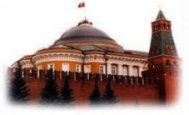A hand-book for future Presidents
 As it is known, Russian presidential elections will take place on March 14, 2004. Today, it seems to be most logical to inquire about the potential candidates for the post.
As it is known, Russian presidential elections will take place on March 14, 2004. Today, it seems to be most logical to inquire about the potential candidates for the post.

Perhaps, because of the fact that the current chairman of the Central Elections Committee Alexander Veshnyakov is originally from Arkhangelsk, local mass media pays a great deal of attention to various elections in our country. Pravda.Ru's informational partner “Dvina-Invorm” has even dedicated a special rubric to such topic. Some interesting information emerges there from time to time. For instance…
In case we all disengage ourselves from reality for a short while and forget of all the names and titles, the following thought reaches the mind: practically anybody can become president in a free democratic country such as ours. Similar to this, is a famous American dream, where even a shoe shiner can become the country's next president.
As it is known, Russian presidential elections will take place on March 14, 2004. Today, it seems to be most logical to inquire about the potential candidates for the post. In reality however things are a bit more complicated. A candidate must first match several important criteria in order to qualify for the elections. First of all, a person has to pass the age criterion. In Russia as well as in the US, a candidate has to no less than 35 years of age. In some countries, such criterion reaches 40. In Italy for instance, a candidate for presidency has to be no less than 50 years of age.
One can also notice a quite distinctive tendency here. The stronger presidential power in the country, the younger the president. Perhaps, this has to do with the fact that work efficiency is strongly connected with one's age. There also exists a “highest” age limit in world’s practice. It is commonly set on 65. More often however, it is a voter’s job to decide which one of either criterion is most important. It is a voter who will have the final say in choosing between experience or age.
This is the case in Russia. Another important criterion for a candidate is his/her permanent residency in the country. In Greece for instance, this limit equals to five years, in Russia—10 years, in USA—14 years. Many countries demand that a candidate has to be a native born. A candidate's obligation to be affiliated with either political party is practically nowhere to be found.
Candidates' affiliations with political parties are in fact quite common occurrence right before elections. Majority of democratic countries for instance have a law stipulating for a candidate from a political party. Nowadays, almost every party in Russia's government which won the November elections is registering its own candidates for presidency. The rest of the independent candidates have to acquire 2 million signatures in order to qualify.
France, in contrast, has a slightly different system. There, a person needs to get only 5,000 signatures to become a legitimate candidate. Those 5,000 signatures however need to be obtained from certain people such as the Parliament's members, members of various Councils, territorial assemblies, and mayors.
Not everyone is capable of collecting this many signatures however. At times, this can only become possible with a well-organized political structure with a substantial financial basis. Aside form Constitutions and various electoral laws, there also exist certain constitutional traditions. A US candidate for presidency for instance has to comply with the W.A.S.P. formula. In other words, the candidate must be a White Protestant of Anglo-Saxon descent. In those countries where Church and Government are inseparable, a candiadte must also practice that particular religion.
Obviously, the way each candidate is being chosen for the run, mainly deals with the country's rules and traditions. While comparing and contrasting various electoral systems, we arrive to the conclusion that Russian legislation is in fact the most liberal. All of the requirements appear to be minimal and are all well-grounded logically.
Based on the materials of the Central Elections Committee of the Russian Federation.
Source: “Dvina-Inform”
Subscribe to Pravda.Ru Telegram channel, Facebook, RSS!


